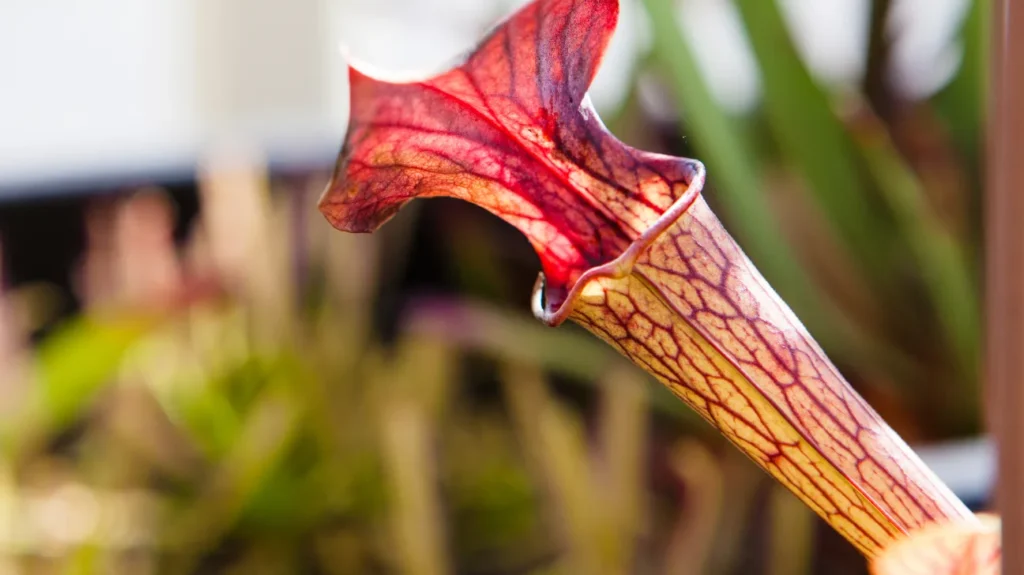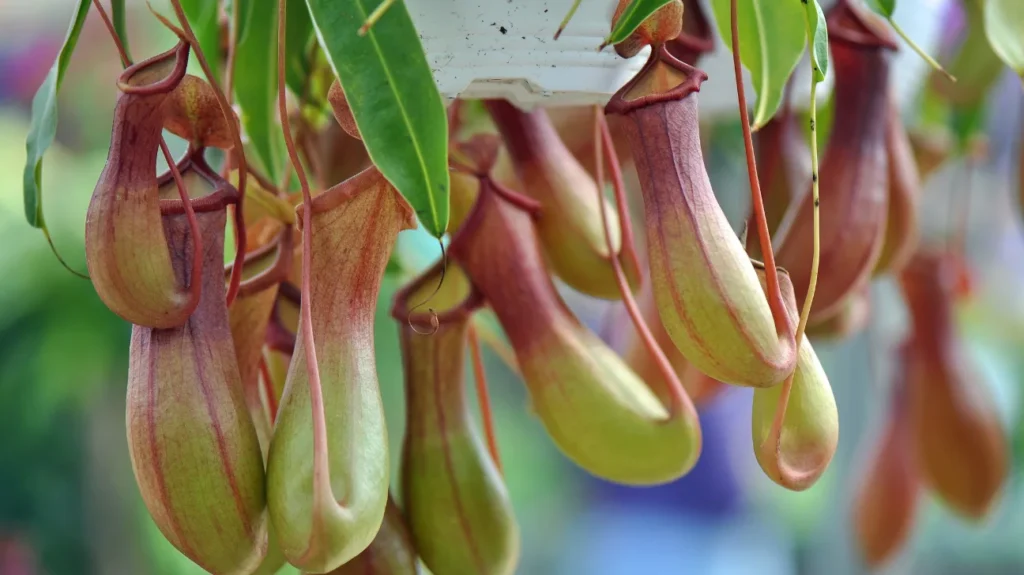The Pitcher plant, primarily belonging to the family Sarraceniaceae, is an intriguing carnivorous plant known for its unique adaptations to nutrient-poor environments. Native to tropical and subtropical regions, it has garnered interest not only for its ecological significance but also for its potential health benefits, particularly as a nootropic supplement. Nootropics are substances that may enhance cognitive function, memory, creativity, and motivation. This article delves into the Pitcher plant’s chemistry, physiological mechanisms, potential nootropic benefits, recommended dosages, side effects, interactions, and other essential information regarding its use as a supplement.
You May Also Like:
Blue-Green Algae: Benefits, Dosage, Side Effects, Drug Interactions, and Other Important Information
Sources of Pitcher Plant
The Pitcher plant can be found in various regions around the world, notably in North America, Southeast Asia, and Australia. The two main types of Pitcher plants are the Sarracenia species and the Nepenthes species.
- Sarracenia: Commonly referred to as North American Pitcher plants, these species thrive in wetlands and bogs, characterized by their tubular leaves that trap insects for nutrients.
- Nepenthes: Known as tropical Pitcher plants, Nepenthes species are typically found in rainforests. Their unique pitchers are adapted for capturing and digesting prey, primarily insects.
These plants are used in traditional medicine by various cultures, often for their purported therapeutic properties, including anti-inflammatory, antimicrobial, and antioxidant effects.
Experience Whole Health with Amazon’s Best Multivitamins for Body and Brain—Shop Now!

Chemistry of Pitcher Plant
The active compounds in Pitcher plants vary depending on the species but often include alkaloids, flavonoids, and phenolic compounds. One notable active ingredient is sarracenic acid, which has demonstrated anti-inflammatory properties.
- Alkaloids: These nitrogen-containing compounds can have various physiological effects, including analgesic and antispasmodic actions.
- Flavonoids: Known for their antioxidant properties, flavonoids help protect cells from oxidative stress and may enhance cognitive function by improving blood flow to the brain.
- Phenolic compounds: These compounds possess antioxidant capabilities and may contribute to the overall neuroprotective effects of Pitcher plants.
The complex chemistry of these active ingredients plays a crucial role in the physiological mechanisms that may enhance cognitive function, making Pitcher plants an area of interest for nootropic research.
Physiological Mechanisms of Pitcher Plant in the Body and Brain
The physiological effects of Pitcher plant extracts may be attributed to their ability to modulate various biological pathways, particularly those involved in cognitive function.
- Antioxidant Activity: The flavonoids and phenolic compounds present in Pitcher plants may scavenge free radicals and reduce oxidative stress, a key factor in neurodegenerative diseases. This antioxidant activity is particularly vital in protecting neurons from damage and supporting overall brain health.
- Neuroprotective Effects: The compounds found in Pitcher plants may help protect brain cells from apoptosis (programmed cell death) induced by oxidative stress or inflammation. This protective effect may be beneficial in mitigating cognitive decline associated with aging or neurodegenerative diseases.
- Enhanced Cognitive Function: Preliminary studies suggest that the alkaloids in Pitcher plants may enhance neurotransmitter activity in the brain. For instance, they may influence the levels of acetylcholine, a neurotransmitter critical for memory and learning. This modulation could potentially lead to improved cognitive performance and memory retention.
- Anti-inflammatory Effects: Chronic inflammation in the brain is linked to cognitive decline. The anti-inflammatory properties of Pitcher plant extracts may help reduce neuroinflammation, thereby supporting cognitive function and promoting mental clarity.
Transform Your Mood and Reduce Stress with Amazon’s Best Supplements—Shop Now!

Nootropic Benefits of Pitcher Plant
The potential nootropic benefits of Pitcher plant (Sarracenia) extracts are still being explored, but existing research indicates several promising effects that could enhance cognitive function and overall mental well-being. Below are detailed descriptions of the key benefits:
- Cognitive Enhancement
Pitcher plant compounds have shown the ability to improve neurotransmitter activity and reduce oxidative stress in the brain, which suggests a significant potential for enhancing cognitive performance. These extracts may enhance memory, learning, and attention by modulating neurotransmitters like acetylcholine and dopamine, which are crucial for these cognitive processes. Studies have indicated that the phytochemicals in Pitcher plants may promote synaptic plasticity—the brain’s ability to adapt and reorganize itself, which is fundamental for learning and memory formation. - Mood Support
Some studies have indicated that Pitcher plant extracts may possess mood-stabilizing properties. By reducing inflammation and oxidative stress within the brain, these compounds can support emotional well-being and cognitive resilience. The extracts may enhance the levels of serotonin and other neurotransmitters associated with mood regulation, potentially alleviating symptoms of anxiety and depression. This effect may create a more favorable mental environment for cognitive tasks, improving focus and overall mental clarity. - Neuroprotection
The neuroprotective effects of Pitcher plant extracts may be significant in preventing cognitive decline and neurodegenerative diseases. Their ability to reduce oxidative damage and inflammation can be beneficial in protecting against conditions such as Alzheimer’s and Parkinson’s disease. Research has suggested that the antioxidant properties of Pitcher plant extracts could help mitigate the formation of amyloid plaques and tau tangles, which are characteristic of Alzheimer’s disease. Additionally, these extracts may support the maintenance of neuronal integrity, further contributing to long-term brain health. - Stress Relief
The calming effects associated with certain Pitcher plant compounds may contribute to stress reduction, which in turn can positively affect cognitive function. By supporting mental clarity and focus, individuals may experience enhanced productivity. Stress is known to impair cognitive functions such as memory and decision-making; therefore, the stress-relieving properties of Pitcher plant extracts could create a more conducive environment for optimal cognitive performance. - Enhanced Focus and Attention
Preliminary studies suggest that Pitcher plant extracts may help improve focus and attention by enhancing blood flow to the brain. Increased cerebral circulation could lead to better nutrient and oxygen delivery, which is essential for optimal brain function. By potentially regulating the levels of neurotransmitters involved in attentional processes, such as norepinephrine, these extracts might aid individuals in maintaining sustained attention and mental clarity during demanding tasks.

Dosage and Supplementation Guidelines
Currently, there is limited standardized dosing information available for Pitcher plant extracts as a nootropic supplement, largely due to the lack of extensive clinical trials. However, some general guidelines can be considered:
- General Nootropic Dosage: For cognitive enhancement, a common dosage range is between 100 and 500 mg of Pitcher plant extract per day. This dosage may vary based on the specific extract used and individual tolerance.
- Supplement Forms: Pitcher plant extracts are available in various forms, including capsules, powders, and liquid extracts. When choosing a supplement, it is essential to ensure it comes from a reputable source with standardized active ingredient content.
- Consultation with Healthcare Professionals: Given the limited research on optimal dosing, individuals interested in using Pitcher plant extracts for cognitive enhancement should consult a healthcare provider, especially if they have underlying health conditions or are taking other medications.
Achieve Optimal Rest with Amazon’s Top Picks for Sleeping Supplements—Shop Today!
Side Effects and Safety
While Pitcher plant extracts are generally considered safe for most individuals when taken in appropriate doses, some side effects may occur:
- Gastrointestinal Distress: Some users may experience mild digestive upset, including nausea, diarrhea, or abdominal discomfort, especially at higher doses.
- Allergic Reactions: Although rare, individuals may experience allergic reactions, including rashes or swelling. Those with known sensitivities to plants in the Sarraceniaceae family should exercise caution.
- Headaches or Dizziness: In some cases, individuals may report headaches or dizziness when taking Pitcher plant extracts. These effects are generally mild and may subside with continued use or dosage adjustment.
- Drug Interactions: Individuals taking medications should be cautious, as Pitcher plant extracts may interact with certain drugs. For example, the potential effects on neurotransmitter levels could interfere with medications affecting mood or cognition.
Interactions with Other Supplements and Medications
Understanding potential interactions is crucial for ensuring safety and efficacy when combining Pitcher plant extracts with other supplements or medications:
- Antidepressants: Given the potential mood-enhancing properties of Pitcher plant extracts, individuals taking antidepressants should consult their healthcare provider before using these supplements. The combination may alter the efficacy of the medication.
- Cognitive Enhancers: When combined with other nootropic supplements, such as caffeine or L-theanine, Pitcher plant extracts may enhance cognitive function. However, users should monitor their response and adjust dosages accordingly to avoid overstimulation.
- Blood Thinners: Due to the potential anti-inflammatory properties of Pitcher plant extracts, individuals on blood-thinning medications (e.g., warfarin) should exercise caution. The combined effects may enhance the risk of bleeding.
- Other Herbal Supplements: Combining Pitcher plant extracts with other herbal supplements may lead to synergistic effects, but care should be taken to monitor for any adverse reactions.
Risks for Individuals with Certain Health Conditions
While Pitcher plant extracts are generally safe, certain health conditions may necessitate caution:
- Pregnancy and Breastfeeding: There is limited research on the safety of Pitcher plant extracts during pregnancy and breastfeeding. Therefore, it is advisable for women in these stages to avoid supplementation unless prescribed by a healthcare professional.
- Liver Conditions: Individuals with liver conditions should consult their healthcare provider before using Pitcher plant extracts, as they may alter liver metabolism.
- Kidney Conditions: Those with kidney problems should exercise caution, as the kidneys are responsible for filtering substances from the blood. Monitoring kidney function is crucial when taking any supplements.
- Allergic Conditions: Individuals with allergies to similar plants should avoid Pitcher plant extracts to prevent allergic reactions.
Amazon’s Essential Nootropic Picks for Enhanced Memory and Focus—Shop Now!

Should You Consider Pitcher Plant as a Nootropic?
The Pitcher plant presents intriguing potential as a nootropic supplement, with its unique chemistry and physiological mechanisms suggesting cognitive enhancement and neuroprotective benefits. While the current research is still in its nascent stages, the antioxidant and anti-inflammatory properties of Pitcher plant extracts offer promising avenues for future studies on cognitive function and mental clarity.
Individuals seeking cognitive support may consider incorporating Pitcher plant extracts into their wellness routine, particularly those interested in natural supplements. However, it is essential to approach supplementation with caution, consulting healthcare professionals for personalized advice, especially when taking medications or managing pre-existing health conditions.
In summary, the Pitcher plant’s potential as a nootropic supplement warrants further investigation, and its role in enhancing cognitive function may provide a beneficial addition to a holistic approach to brain health.

References:
- Characterizing the cytoprotective activity of Sarracenia purpurea L., a medicinal plant that inhibits glucotoxicity in PC12 cells. Retrieved from: https://link.springer.com/article/10.1186/1472-6882-12-245
- Anticancer and Antioxidant Activities of the Root Extract of the Carnivorous Pitcher Plant Sarracenia purpurea. Retrieved from: https://www.mdpi.com/2223-7747/11/13/1668
- Antimycobacterial triterpenes from the Canadian medicinal plant Sarracenia purpurea. Retrieved from: https://www.sciencedirect.com/science/article/abs/pii/S0378874116302549
- Cytotoxic Activities and the Allantoinase Inhibitory Effect of the Leaf Extract of the Carnivorous Pitcher Plant Nepenthes miranda. Retrieved from: https://www.mdpi.com/2223-7747/11/17/2265
Important Note: The information contained in this article is for general informational purposes only, and should not be construed as health or medical advice, nor is it intended to diagnose, prevent, treat, or cure any disease or health condition. Before embarking on any diet, fitness regimen, or program of nutritional supplementation, it is advisable to consult your healthcare professional in order to determine its safety and probable efficacy in terms of your individual state of health.
Regarding Nutritional Supplements Or Other Non-Prescription Health Products: If any nutritional supplements or other non-prescription health products are mentioned in the foregoing article, any claims or statements made about them have not been evaluated by the U.S. Food and Drug Administration, and such nutritional supplements or other health products are not intended to diagnose, treat, cure, or prevent any disease.


